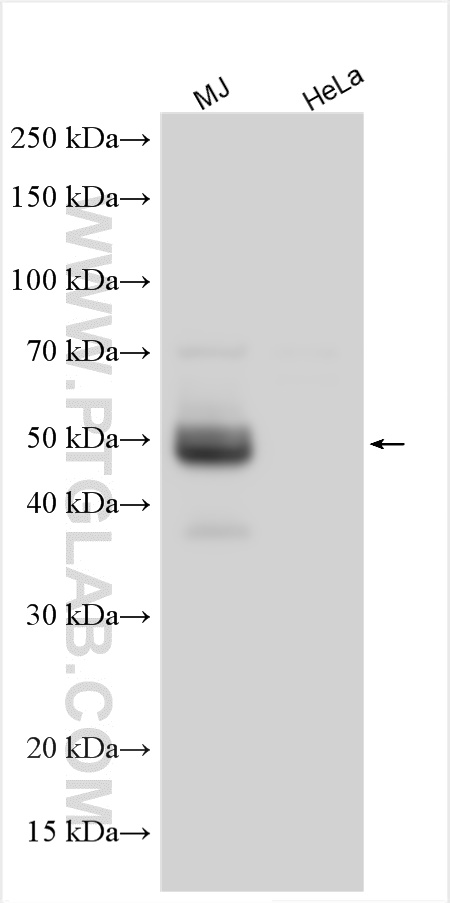验证数据展示
经过测试的应用
| Positive WB detected in | MJ cells |
推荐稀释比
| 应用 | 推荐稀释比 |
|---|---|
| Western Blot (WB) | WB : 1:500-1:1000 |
| It is recommended that this reagent should be titrated in each testing system to obtain optimal results. | |
| Sample-dependent, Check data in validation data gallery. | |
产品信息
29361-1-AP targets CD134/OX40 in WB, ELISA applications and shows reactivity with Human samples.
| 经测试应用 | WB, ELISA Application Description |
| 经测试反应性 | Human |
| 免疫原 | CD134/OX40 fusion protein Ag28521 种属同源性预测 |
| 宿主/亚型 | Rabbit / IgG |
| 抗体类别 | Polyclonal |
| 产品类型 | Antibody |
| 全称 | tumor necrosis factor receptor superfamily, member 4 |
| 别名 | ACT35, ACT35 antigen, CD134, CD134/OX40, OX40, OX40L receptor, TNFRSF4, TXGP1L |
| 计算分子量 | 29 kDa |
| 观测分子量 | 50 kDa |
| GenBank蛋白编号 | NM_003327 |
| 基因名称 | CD134 |
| Gene ID (NCBI) | 7293 |
| RRID | AB_3669684 |
| 偶联类型 | Unconjugated |
| 形式 | Liquid |
| 纯化方式 | Antigen affinity purification |
| UNIPROT ID | P43489 |
| 储存缓冲液 | PBS with 0.02% sodium azide and 50% glycerol, pH 7.3. |
| 储存条件 | Store at -20°C. Stable for one year after shipment. Aliquoting is unnecessary for -20oC storage. |
背景介绍
CD134, also known as OX40 and TNFRSF4, is a member of the TNFR-superfamily of receptors (PMID: 2828930; 9766631). It is a type I transmembrane protein predominantly expressed on activated T cells which include CD4 and CD8 T cells, Th2, Th1, and Th17 cells, as well as regulatory T cells (Tregs) (PMID: 20307208). CD134 is activated by its cognate ligand CD134L (OX40L) and functions as a T cell co-stimulatory molecule (PMID: 26215166). CD134-CD134L interactions have been proposed as a potential therapeutic target for treating autoimmune diseases, cancer and infectious disease (PMID: 26215166; 19426222).
实验方案
| Product Specific Protocols | |
|---|---|
| WB protocol for CD134/OX40 antibody 29361-1-AP | Download protocol |
| Standard Protocols | |
|---|---|
| Click here to view our Standard Protocols |
